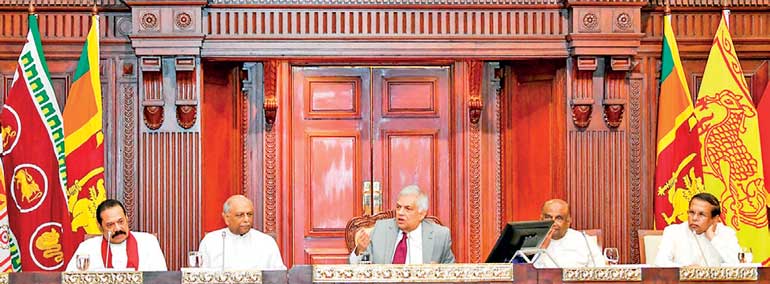Wednesday Feb 18, 2026
Wednesday Feb 18, 2026
Saturday, 28 January 2023 02:05 - - {{hitsCtrl.values.hits}}

In an effort to settle the ethnic conflict, President Ranil Wickremesinghe insisted on working towards a consensus-based solution to enact the 13th Amendment to the Constitution.
“We can’t remain in a middle position. We should either implement the 13th Amendment or abolish it,” he said at the All-Party Conference held at the Presidential Secretariat on Thursday.
Prime Minister Dinesh Gunawardena, Speaker Mahinda Yapa Abeywardena Former Presidents Mahinda Rajapaksa and Maithripala Sirisena, Ven. Athuraliye Rathana Thero, Ministers Wijeyadasa Rajapakshe, Pavithra Wanniarachchi, Douglas Devananda, Tiran Alles MPs Prof. Tissa Vitharana, Vajira Abeywardena, Rishad Bathiudeen, Kumara Welgama, Rajitha Senaratne, Duminda Dissanayake, Mahindanada Aluthgamage, M.A. Sumanthiran, Rauff Hakeem, C.V. Vigneswaran, Suren Raghavan, Sarath Weerasekara, Sivanesathurai Santhirakanthan, Sagara Kariyawasam, Gevindu Kumaratunga, A.L.M. Athaullah, Imran Maharoof and representatives of the party representing the Parliament were present.
He said that he is bound to implement the existing law in accordance with the executive powers of the President, adding that the 13th Amendment to the Constitution is being implemented accordingly or the Parliament should abolish the amendment.
“It is my responsibility as the Executive to carry out the current law. For around 37 years, the 13th Amendment has been a part of the Constitution. I must implement or someone has to abolish it by way of a 22nd Amendment to the Constitution by moving a private member’s bill. If the bill was voted against by the majority in the House, then the 13th Amendment would have to be implemented.” President Wickremesinghe said.
He also pointed out that any parliamentarian could move a private member’s bill to abolish the 13th Amendment to the Constitution and the same amendment would have to be implemented provided that the bill was voted against by the majority of the House.
The President stressed that he was not ready to divide the country at all and would not betray the Sinhalese nation as well.
“I am acting in accordance with the decision delivered by the Supreme Court Bench regarding the 13th Amendment, in particular, Chief Justice Palinda Ranasinghe’s ruling. If we stick to that, we might say that we are in a ‘united’ state. I oppose a federal State but devolution of power. The Provincial Councils in Sri Lanka do not have at least the powers that are vested in the London City Council. Hence, we can’t define this as a federal State,” he added.
Noting that the late President J.R. Jayewardene introduced many clauses along with the Attorneys-at-Law not to make Sri Lanka a Federal State, he said thus far, every President has decided to put this into action.
“So, either we ought to get rid of the 13th Amendment or should implement it,” Wickremesinghe added.
“Neither any of here nor I am ready to divide our country. These individuals will not betray the Sinhalese. If there are Sinhalese, they should coexist with other ethnic groups such as Tamils, Muslims, and Burghers. I have no doubt that if we protect the notion in the line ‘children of one mother’ in our national anthem, we could go forward united,” he stressed.
It was also highlighted that a massive extension of land was under the Government by the time the conflict came to an end in 2009 and thereafter most of those lands were released to the public under the reigns of former Presidents Mahinda Rajapaksa and Maithripala Sirisena. The largest extension of lands in Jaffna was issued under the reign of former President Maithripala Sirisena. There is only a land extension of 3,000 acres under the Government as of now.
The release of that extension land too should be entrusted to the security forces to be done without causing interruption to the security activities. He also said they discuss the release of those lands with the Defence Secretary, the Chief of Defence staff, and the Commanders of Tri Forces and acted upon their views.
“The Land Commission needs to be established immediately. The draft bill in that regard could be moved by March. The Constitution has it that nine representatives from each province should be included while 12 are appointed by the President. Then a national land policy should be formulated. Thereafter, the National Land Policy could be put into action by the Land Commission,” he explained.
He noted that the Land Commission should be allowed to decide on the extension of land required to enhance the forest cover in accordance with the Government’s policy of up to 30%.
“We shall work toward a consensus-based solution for the political and economic issues one step at a time. Let’s solve our political and economic issues step by step in a manner that could be accepted by all,” he asserted.
President Wickremesinghe also said if the establishment of the National Police Commission instead of a Provincial Police Commission is objected to, an amendment should be made. However, either should be done.
The measures that would be taken in this regard would be presented to the Parliament on 8 February and if there are any suggestions, they could be made so before 4 February so that they may be considered and submitted on 8 February.
“Let’s act as we agreed earlier without being stuck in this problem. We neither betray any nor divide the country and the country is united today,” Wickremesinghe added.
